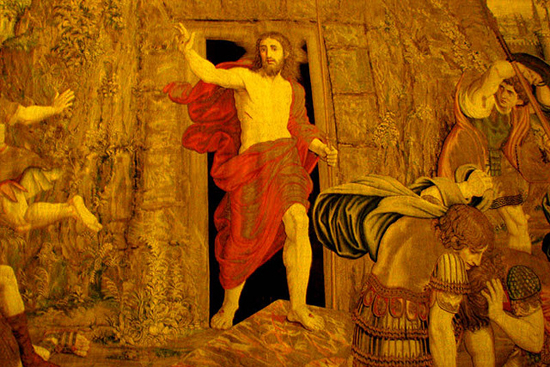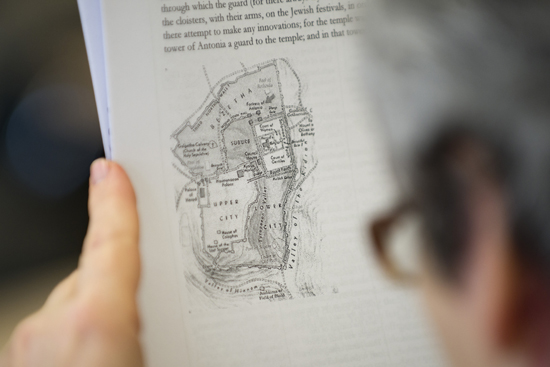One Class, One Day: From Jesus to Christ
How a man became God to his followers

Jennifer Knust teaches how Jesus came to be perceived as the Messiah. Photo of The Resurrection of Our Lord, “Scuola Nuova” series episodes of the Christ Life, Musei Vaticani. Courtesy of Flickr contributor Storm Crypt
Class by class, lecture by lecture, question asked by question answered, an education is built. This is one of a series of visits to one class, on one day, in search of those building blocks at BU.
In the Middle Ages, Jennifer Knust’s students might have tried to burn one another at the stake. A theological collage of Christians, non-Christians, and wavering Christians, they could, at a modern political rally, wage a toe-to-toe, finger-wagging shout-fest. But in Knust’s From Jesus to Christ class, everyone respects all viewpoints as they ponder the question: how did a Jewish peasant come to be seen as the divine savior of the world by his followers in the two centuries after his execution?
Studying that death in a recent class, Knust, a College of Arts & Sciences associate professor of religion, distributes excerpts from the four Gospels, the earliest biographies of Jesus, describing the plot against him and his arrest. Make that “biographies” in quotes; the evangelists weren’t attempting a journalistic blow by blow, Knust stresses, but rather composed theological briefs about their crucified spiritual leader, all aimed at different audiences facing different historical situations and needs. An animated lecturer (at one juncture, she stretches out her arms cross-like to emphasize a point), she peppers her history of first-century Jerusalem with colorful details about life under the occupying Roman Empire. (“There’s a story about a Roman soldier mooning the Jews that were there for a festival.”)

As historians, the Gospel writers, who penned their accounts decades after the crucifixion, “often do a lousy job,” Knust tells the class. But “if we want from them an explanation of the death of Jesus…that inspires followers 50 years later, they did a great job.” If this imbues the greatest story ever told with multiple stories rather than a single, factually historical narrative, “I’m not sure that’s as important to the first followers of Jesus as it is to Christians today,” she says.
This isn’t heresy; even the Vatican has given its imprimatur to Catholic scholars speculating on the nonliteralness of such doctrines as Jesus’ virgin birth. (“The infancy narratives are primarily vehicles of the evangelists’ theology and Christology,” writes Raymond Brown, while another Catholic, John Meier, says researchers don’t have the means “to reach a final decision on the historicity of the virginal conception,” both cited in the book Gospel Truth.) But in a campaign year that has seen presidential candidate Rick Santorum rallying admirers by charging Barack Obama with “phony theology,” respectful religious discourse can seem as miraculous as the Resurrection.

“It’s kind of a difficult topic to wrestle with, but I think everyone’s pretty open and accepting of differing views, and it’s a very safe environment to exchange ideas,” says Rebecca Kreshak (COM’14, CAS’14). She’s a Christian and a church intern who believes Jesus was the Christ, the preexisting Word made flesh of John’s Gospel. Yet the course discussions give the class a feel “like family,” almost as if they were exchanging opinions over the dinner table. Besides, Kreshak doesn’t wilt when her beliefs are challenged. Studying biblical authors as people influenced by their history and social circumstances actually has strengthened her faith (she’s contemplating seminary after graduation). “There’s so much that I don’t know, and that’s so overwhelming, but it’s also exciting. Because of my Christian faith, I already believe the Christ part, and I feel like this class is helping me realize more the Jesus part, the human side of Christ. This was a person who was walking around.”
Knust herself is an American Baptist minister, but she says that she “can change my hat, or my stole as the case may be,” and put on her professor’s mortarboard, goading students to think critically within the necessarily nondivine confines of historical analysis. There’s no preaching or effort to shake student beliefs, be they devout or atheist. “We’re not going to be deciding whether Jesus really was the Christ. That’s not our job,” she says. “Our job is to try to understand how people argued that Jesus was the Christ.”
She sometimes nudges students to air their convictions fearlessly. When one prefaced recent remarks by saying, “I don’t want to offend anybody, but—” Knust says she jumped in with, “Look, we can offend each other. That’s OK. We’re going to be respectful, but we don’t have to agree.”

Michael Lavallee (COM’14) took the class partly to help wrestle with questions he has about his Catholicism. “While I’m not 100 percent sold on everything and not sure I will always be a Catholic,” he says, “I feel that this class has helped clarify some questions I had and given me some factual insight into Jesus’ life.” Knust, he says, provides “a comfortable environment to discuss this question.”
If the course name sounds familiar, that’s because it is also the title of a book (and subsequent 1998 PBS series) written by Paula Fredriksen, a College of Arts & Sciences professor currently on leave, from whom Knust inherited the class. Fredriksen’s book is on the syllabus, along with scripture and American Jesus: How the Son of God Became a National Icon, by Stephen Prothero, a CAS professor of religion, which documents how Americans have long cast the Nazarene according to their biases, be it ardent capitalist/environmentalist/soldier/pacifist.
That’s a big takeaway from the class. Then as now, says Knust, “the way Jesus is being situated is very much related to our own cultural expectations about who he can be.”
This Series
Also in
One Class, One Day
-
November 30, 2018
Breaking Bad Director Gives CAS Class the Inside Dope
-
October 31, 2018
Trump and the Press: We’ve Been Here Before
-
August 3, 2018
A Scholarly Take on Superheroes


Comments & Discussion
Boston University moderates comments to facilitate an informed, substantive, civil conversation. Abusive, profane, self-promotional, misleading, incoherent or off-topic comments will be rejected. Moderators are staffed during regular business hours (EST) and can only accept comments written in English. Statistics or facts must include a citation or a link to the citation.